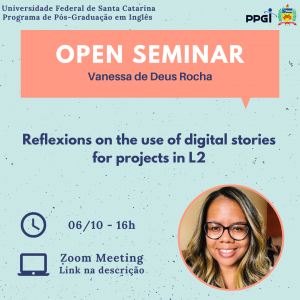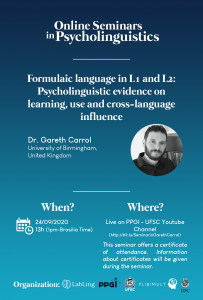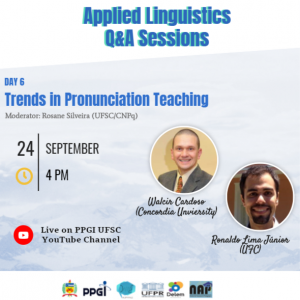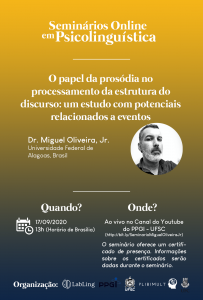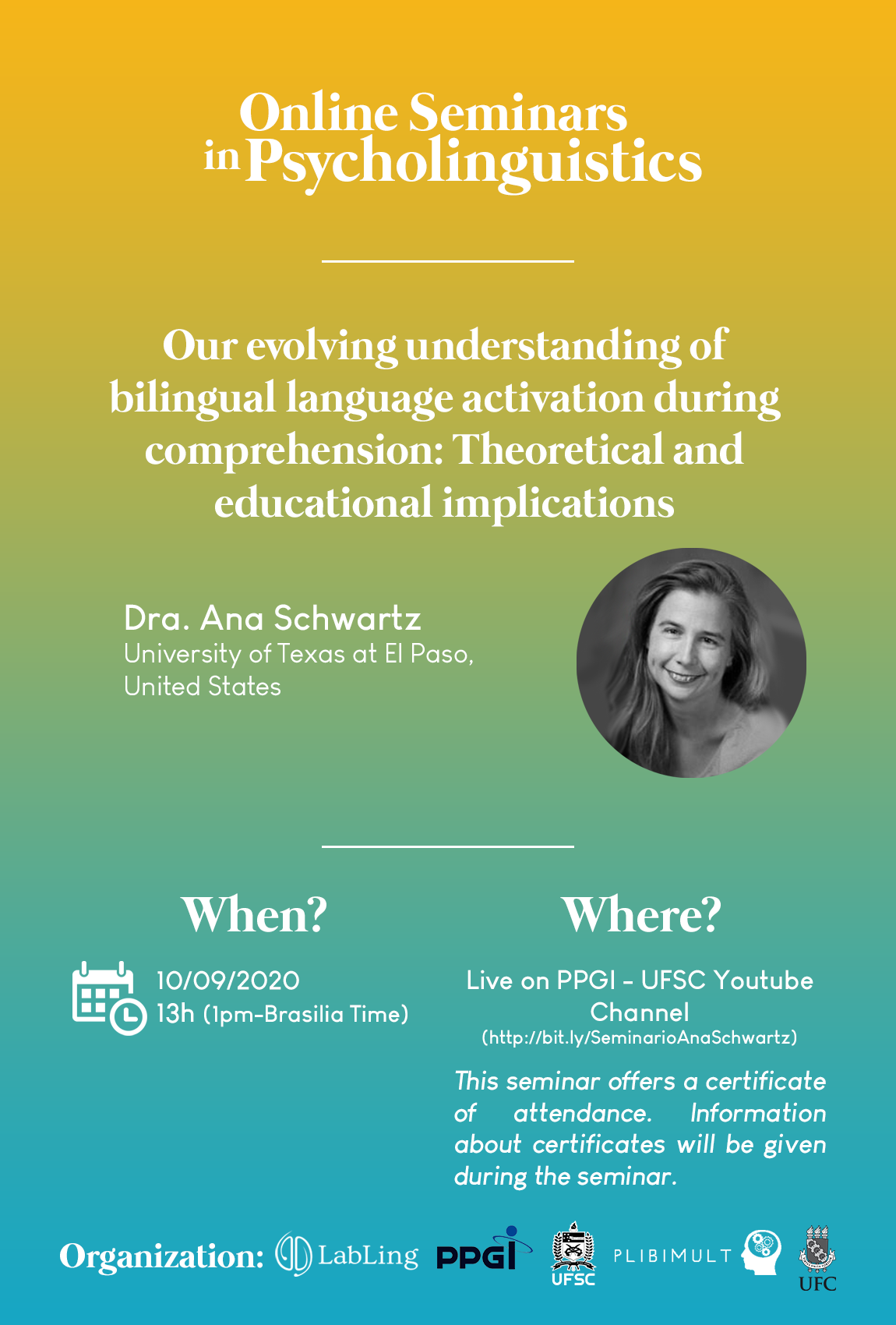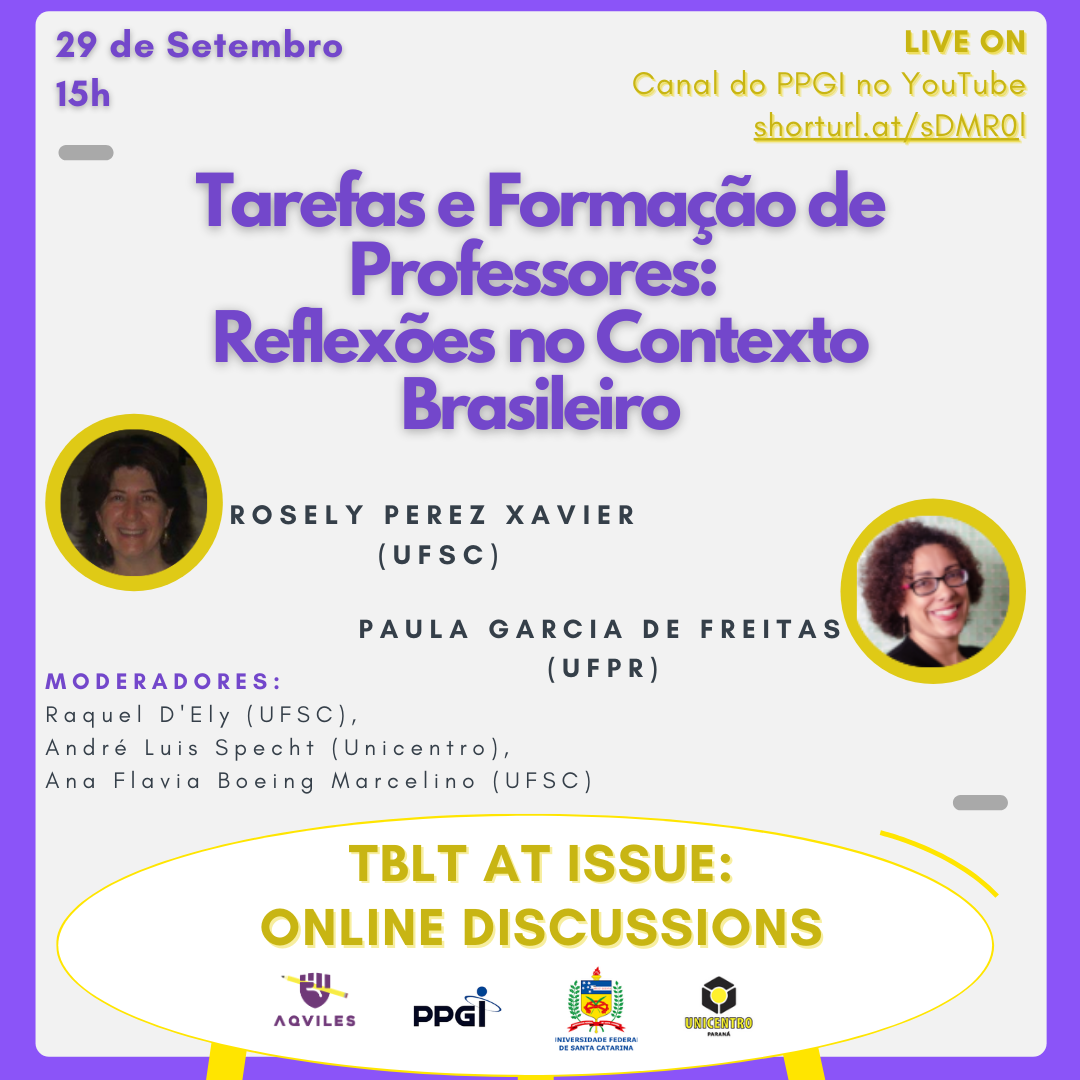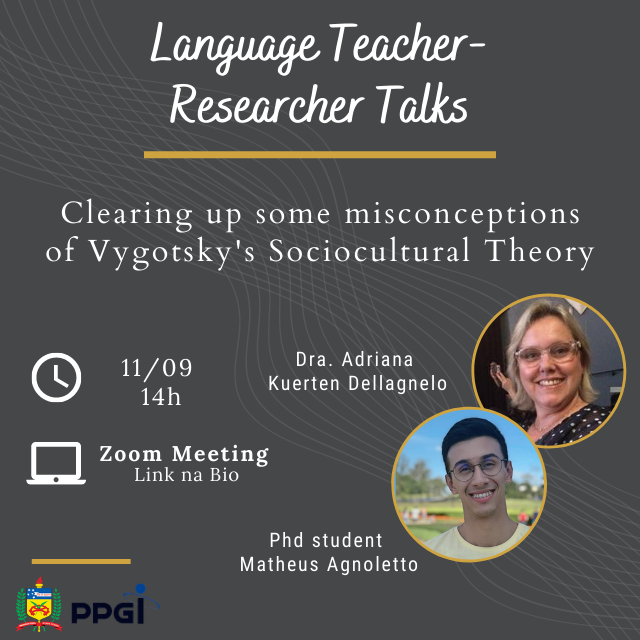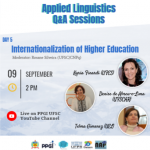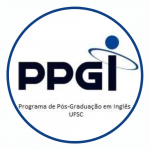A 9º videoconferência dos Seminários Online em Psicolinguística/Online Seminars in Psycholinguistics abordará os estudos processuais da tradução em interface com a psicolinguística. A videoconferência dá direito a certificado de participação como ouvinte e as informações sobre certificação serão fornecidas durante a transmissão. Junte-se a nós nos Seminários!
Expertise em tradução: uma abordagem psicolinguística
Prof. Dr. Fabio Alves (UFMG)
 5a. feira – 03/09/2020 – 13h (Horário de Brasília)
5a. feira – 03/09/2020 – 13h (Horário de Brasília)
Transmissão ao vivo pelo canal do PPGI-UFSC no Youtube
Instagram: @labling.ufsc/ @plibimult
Facebook: @lablingufsc/ @plibimult
A atividade tradutória, vista do ponto de vista cognitivo, pode ser considerada como um “problema mal definido” (Shreve, 2006). Em outras palavras, trata-se de atividade sem uma solução final pré-definida, sendo possível obter um número aberto de boas soluções desde que a tarefa seja executada por bons tradutores. Tampouco é fácil definir o que seja um “bom tradutor”. Chesterman (1997) qualifica tradutores como iniciantes, avançados, competentes, proficientes e expertos. A evolução no desempenho de um tradutor iniciante que se torna um tradutor experto pode ser vista como uma trajetória rumo à expertise (Lajoie, 2003). Permanece, contudo, a indagação sobre como esta evolução ocorre. Adotando uma perspectiva experimental, com orientação psicolinguística, esta apresentação pretende abordar o conceito de prática deliberada (Ericsson, 2002) como condição para que a expertise em tradução se consolide não apenas com base no tempo de experiência do tradutor mas, sobretudo, pela forma como a prática deliberada pode levar ao surgimento de novas estruturas cognitivas capazes de apoiar o desempenho experto em tradução. Ilustrada com dados empíricos, esta apresentação pretende mostrar um modelo de expertise em tradução (Alves & Gonçalves, 2007, 2013), resultante da integração de domínios cognitivos distintos e discutir os principais componentes que subjazem à estrutura do modelo.
Bio:
Fabio Alves é Professor Titular de Estudos Linguísticos da Universidade Federal de Minas Gerais (UFMG), onde atua no Programa de Pós-Graduação em Estudos Linguísticos. Possui doutorado em Linguística Aplicada (Sprachlehrforschung) pela Ruhr Universität Bochum (1995), na Alemanha, com pós-doutorados na Universidade Autônoma de Barcelona (2003-2004) e na Copenhagen Business School (2012-2013). Foi Presidente da Associação Brasileira de Pesquisadores em Tradução (ABRAPT) no triênio 2004-2007 e Presidente da Associação Nacional de Pós-Graduação e Pesquisa em Letras e Linguística (ANPOLL) no biênio 2008-2010. Tem experiência na área de Linguística Aplicada, com ênfase nos estudos da tradução como atividade cognitiva, e enfoque nos seguintes temas: interação humano-máquina em tradução, pesquisas experimentais sobre o processo de tradução e pesquisas sobre expertise em tradução. Entre suas publicações, destacam-se Traduzir com Autonomia: estratégias para o tradutor em formação (Contexto, 2000); Triangulating Translation: perspectives in process-oriented research (John Benjamins, 2003), Competência em Tradução: cognição e discurso (Editora UFMG, 2005), Translation as a Cognitive Activity (Routledge, 2009), Investigating cognitive effort in post-editing (Machine Translation, 2015), Evolution, challenges, and perspectives for research on cognitive aspects of translation (Blackwell, 2017) e o recém-lançado Routledge Handbook of Translation and Cognition (2020).
Leituras recomendadas:
ALVES, Fabio; JAKOBSEN, Arnt. Grounding Cognitive Translation Studies: Goals, commitments and challenges. In: Fabio Alves; Arnt Lykke Jakobsen. (Orgs.). The Routledge Handbook of Translation and Cognition. New York: Routledge, p. 545-554, 2020.
ALVES, Fabio; HURTADO ALBIR, Amparo Evolution, challenges, and perspectives for research on cognitive aspects of translation. In: John Schwieter; Aline Ferreira. (Org.). The Handbook of Translation and Cognition. New Jersey: Wiley Blackwell, p. 537-554, 2017.
ALVES, Fabio. Bases epistemológicas e paradigmáticas para pesquisas empírico-experimentais sobre competência tradutória: uma reflexão crítica. DELTA. Documentação de Estudos em Linguística Teórica e Aplicada 31, p. 283-315, 2015.
ALVES, Fabio; GONÇALVES, José Luiz. Modelling translator’s competence: relevance and expertise under scrutiny. In: Yves Gambier; Miriam Schlesinger; Radegundis Stolze. (Org.). Translation Studies: doubts and directions. Amsterdam: John Benjamins, p. 41-55, 2007.
ALVES, Fabio. Triangulating translation: Perspectives in process-oriented research. Amsterdam: John Benjamins, 2003.
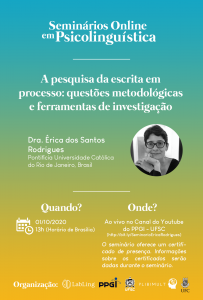 in Psycholinguistics que abordará a pesquisa sobre o processamento online da escrita. A videoconferência dá direito a certificado de participação como ouvinte e as informações sobre certificação serão fornecidas durante a transmissão. Esse evento é organizado pelo LabLing (UFSC), com o apoio do PPGI, em parceria com o Plibimult (UFC/POET).
in Psycholinguistics que abordará a pesquisa sobre o processamento online da escrita. A videoconferência dá direito a certificado de participação como ouvinte e as informações sobre certificação serão fornecidas durante a transmissão. Esse evento é organizado pelo LabLing (UFSC), com o apoio do PPGI, em parceria com o Plibimult (UFC/POET).







